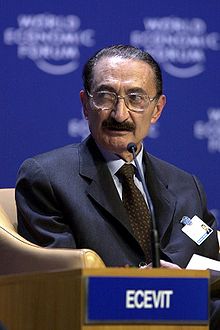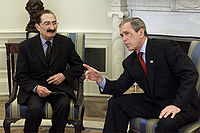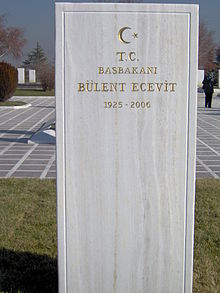- Bülent Ecevit
-
Mustafa Bülent Ecevit 
Prime Minister of Turkey In office
January 11, 1999 – November 18, 2002Preceded by Mesut Yılmaz Succeeded by Abdullah Gül In office
January 5, 1978 – November 12, 1979Preceded by Süleyman Demirel Succeeded by Süleyman Demirel In office
June 21, 1977 – July 21, 1977Preceded by Süleyman Demirel Succeeded by Süleyman Demirel In office
January 26, 1974 – November 17, 1974Preceded by Naim Talu Succeeded by Sadi Irmak Leader of CHP In office
May 14, 1972 – October 30, 1980Preceded by İsmet İnönü Succeeded by Deniz Baykal Leader of DSP In office
January 15, 1989 – July 25, 2004Preceded by Necdet Karababa (acting) Succeeded by Zeki Sezer In office
September 13, 1987 – March 7, 1988Preceded by Rahşan Ecevit Succeeded by Necdet Karababa Personal details Born 28 May 1925
(Constantinople)/IstanbulDied 5 November 2006 (aged 81)
AnkaraPolitical party DSP, CHP Spouse(s) Rahşan Ecevit Alma mater Robert College
School of Oriental and African StudiesReligion Sunni Islam Signature 
Mustafa Bülent Ecevit (Turkish: [byˈlent edʒeˈvit]; 28 May 1925– 5 November 2006) was a Turkish politician, poet, writer and journalist, who was the leader of Republican People's Party (CHP), later of the Democratic Left Party (DSP) and four-time Prime Minister of Turkey.
Contents
Personal life
Born in Ankara, Ecevit's father was Ahmet Fahri Ecevit who was born in Kastamonu and was a professor of forensic medicine at Ankara University. Later Ahmet Fahri started his political life as CHP's Kastamonu deputy between 1943-1950. His mother, Fatma Nazlı, was born in Istanbul and was among the first women in Turkey to paint professionally.[1] In 1944, Ecevit graduated from Robert College in Istanbul and later from the University of London's School of Oriental and African Studies,[2] and then started working as a translator in the Press Publication Head Office (Basın Yayın Genel Müdürlüğü). He married his classmate Rahşan Aral in 1946. He went to the United States in the mid–1950s on a State Department fellowship, and worked at two newspapers in North Carolina.[1]
His paternal grandfather's name was Kürtzade (son of Kurd) Mustafa Şükrü Efendi[3][4][5][6] and Ecevit has said Maybe I am a Kurdish ancestry.[7][8]
Political life
Ecevit was elected into the Turkish parliament for the first time in 1957. He was a Member of the Parliament between 1960 and 1961. Ecevit served as the Minister of Labour between 1961 and 1965, contributing to the acceptance of the right to strike and collective agreement. In 1966 he became the secretary general of the Republican People's Party (Turkish: Cumhuriyet Halk Partisi, CHP). In 1971 he resigned from the post as a protest to the party decision to support the transitional government established by a military intervention.
In 1972, he succeeded İsmet İnönü as the leader of the party and became Prime Minister in a coalition with the National Salvation Party of Necmettin Erbakan. This government is most noted for ordering Turkish invasion of Cyprus on July 20, 1974. The landing ended in August 1974, when Turkish troops occupied 37% of the island's territory, which was followed by the establishment of a de facto state Turkish Republic of Northern Cyprus in 1983.
Bülent Ecevit recalls that he learned for the first time of the existence of Operation Gladio, a secret "stay-behind" NATO army, in 1974, and has suspected "Counter-Guerrilla", the Turkish branch of Gladio, of being responsible for the May 1, 1977 Taksim Square massacre in Istanbul, during which snipers shot on a protest rally of 500,000 citizens, killing 38 and injuring hundreds. CHP defeated AP at the 1977 general elections by gathering 41% of the votes. This victory was just after the events of May 1 and the victory of CHP was seen as the answer of the left wing of Turkish politics.
Following the 1980 coup led by General Kenan Evren, Ecevit was incarcerated and suspended from active politics for life along with the other political leaders of the time. A referendum in 1987 lifted his ban from politics, and he became the chairman of the Democratic Left Party (Turkish: Demokratik Sol Parti, DSP), inheriting the position from his wife, Rahşan Ecevit. His party failed to enter the National Assembly at the 1987 national elections, and in spite of passing the electoral barrier in 1991 managed to win only 7 seats in parliament. DSP's fortunes changed after the 1995 elections, when the party won 75 seats (out of 550). After two short-lived governments (formed by Mesut Yılmaz and Necmettin Erbakan, respectively), Ecevit became a deputy prime minister in the last government of Mesut Yılmaz. In 1998-99 he was briefly the caretaker Prime Minister in the run-up to the 1999 general elections. In those elections - also helped by the fact that Abdullah Öcalan, head of the separatist (PKK) was apprehended in Kenya and flown to Turkey during this period - Ecevit's party gained the largest number of seats, leading to Ecevit's final term as Prime Minister in a coalition with the Motherland Party (Turkish: Anavatan Partisi, ANAP) of Mesut Yılmaz and the Nationalist Movement Party (Turkish: Milliyetçi Hareket Partisi, MHP) of Devlet Bahçeli.
Ecevit's government undertook a number of reforms aimed at stabilizing the Turkish economy in preparation for accession negotiations with the European Union. However, the short-term economic pain brought on by the reforms caused rifts within his coalition and party, and eventually forced new elections in 2002. Ecevit, at this time visibly frail, was unsuccessful in leading his party back into the National Assembly. Ecevit subsequently retired from active politics in 2004.
Bülent Ecevit was not only a politician but also a poet and a writer. He studied Sanskrit, Bengali, and English at the University of London's School of Oriental and African Studies,[2] and translated works by Rabindranath Tagore, T. S. Eliot, and Bernard Lewis into Turkish. Ecevit, who also studied at the American Robert College, one of the most prestigious high schools in Istanbul, was successful in these literary endeavors despite never having graduated from a university, a fact that also prevented him from ever running for the Presidency of the Turkish Republic.
Ecevit was hospitalized at the Gülhane Military Hospital in Ankara and placed in a medically-induced coma after suffering a cerebral hemorrhage on May 18, 2006.[9] He died on November 5, 2006 at 20:40 (UTC) due to respiratory failure without regaining consciousness. He was laid to rest in the Turkish State Cemetery (Turkish: Devlet Mezarlığı) in Ankara with a state funeral on November 11, 2006. The funeral was attended by approximately 1,000,000 people from all 81 provinces.[10]
Works
Poetry
- Işığı Taştan Oydum (I Carved Light Out Of Stone) (1978)
- El Ele Büyüttük Sevgiyi (We Raised Love Hand In Hand) (1997)
Political
- Ortanın Solu (Left of the Center) (1966)
- Bu Düzen Değişmelidir (This Order Should Change) (1968)
- Atatürk ve Devrimcilik (Atatürk and Revolutionism) (1970)
- Kurultaylar ve Sonrası (Party Congresses and After) (1972)
- Demokratik Sol ve Hükümet Bunalımı (Democratic Left and Government Crisis) (1974)
- Demokratik Solda Temel Kavramlar ve Sorunlar (Basic Definitions and Problems in Democratic Left) (1975)
- Dış Politika (Foreign Policy) (1975)
- Dünya-Türkiye-Milliyetçilik (World-Turkey-Nationalism) (1975)
- Toplum-Siyaset-Yönetim (Society-Politics-Government) (1975)
- İşçi-Köylü El Ele (Workers and Peasants Hand in Hand) (1976)
- Türkiye / 1965-1975 (Turkey / 1965-1975) (1976)
- Umut Yılı: 1977 (Year of Hope: 1977) (1977)
References
- ^ a b Kinzer, Stephen (November 6, 2006). "Bülent Ecevit, a Political Survivor Who Turned Turkey Toward the West, Is Dead at 81". The New York Times. p. 2. http://www.nytimes.com/2006/11/06/world/europe/06ecevit.html?pagewanted=2&_r=1. Retrieved 2006-11-06.
- ^ a b Turgut, Pelin (2006-11-07). "Bulent Ecevit". The Independent. http://www.independent.co.uk/news/obituaries/bulent-ecevit-423240.html. Retrieved 2008-12-24.
- ^ "Kürtzade Ecevit", Yeni Şafak, (Turkish)
- ^ "Ececit: Babam Kürt...", Zaman, September 7, 2005.
- ^ Aytekin Gezici, Bülent Ecevit, Bir Karaoğlan Masalı, Akis, 2006. Aras Erdoğan, Umut Ecevit, Kesit, 2006, p. 19.
- ^ Altan Tan, Kürt Sorunu, Timaş, 2009, p. 493.
- ^ Ercan Yavuz, "Kürt kökenli olabilirim", Akşam, August 4, 2004. (Turkish)
- ^ Mahmut Çetin, Çinli Hoca'nın torunu Ecevit, Emre Yayınları, 2006, p. 18.
- ^ Baki, Mehmet (2006-05-25). "Well Wishes for Ecevit Written in Visitors". Today's Zaman. http://www.todayszaman.com/tz-web/detaylar.do?load=detay&link=33400. Retrieved 2008-10-22.
- ^ Cevizoğlu, Hulki (11 November 2006), Kanaltürk Evening News.[verification needed]
External links
- Siyasetin Şairi, Karaoğlan, Hürriyet, November 2002 (Turkish)
- A Selection of Ecevit's Poetry (Turkish)
Party political offices Preceded by
İsmet İnönüLeader of the Republican’s People Party (CHP)
May 14, 1972–Oct 29, 1980Succeeded by
1980 Military coup and later Deniz BaykalPreceded by
Rahşan EcevitLeader of the Democratic Left Party (DSP)
Sep 13, 1987–1988Succeeded by
Necdet KarababaPreceded by
Necdet KarababaLeader of the Democratic Left Party (DSP)
1989–Jul 25, 2004Succeeded by
Zeki SezerPolitical offices Preceded by
Naim TaluPrime Minister of Turkey
Jan 26, 1974–Nov 17, 1974Succeeded by
Sadi IrmakPreceded by
Süleyman DemirelPrime Minister of Turkey
Jun 21, 1977–Jul 21, 1977Succeeded by
Süleyman DemirelPreceded by
Süleyman DemirelPrime Minister of Turkey
Jan 5, 1978–Nov 12, 1979Succeeded by
Süleyman DemirelPreceded by
Tansu ÇillerDeputy Prime Minister of Turkey
Jun 30, 1997–Jan 11, 1999Succeeded by
Hüsamettin Özkan
Hikmet UluğbayPreceded by
Mesut YılmazPrime Minister of Turkey
Jan 11, 1999–Nov 19, 2002Succeeded by
Abdullah GülLeaders of the Republican People's Party Mustafa Kemal Atatürk · İsmet İnönü · Bülent Ecevit · Deniz Baykal · Hikmet Çetin · Deniz Baykal · Altan Öymen · Deniz Baykal · Kemal KılıçdaroğluLeaders of the Democratic Left Party Rahşan Ecevit · Bülent Ecevit · Necdet Karababa · Zeki Sezer · Masum Türker
Prime Ministers of the Republic of Turkey (List) War of Independence
(1920–1923)Republic of Turkey
(since 1923)İsmet İnönü · Fethi Okyar · İsmet İnönü · Celal Bayar · Refik Saydam · Şükrü Saracoğlu · Recep Peker · Hasan Saka · Şemsettin Günaltay · Adnan Menderes · Cemal Gürsel · İsmet İnönü · Suat Hayri Ürgüplü · Süleyman Demirel · Nihat Erim · Ferit Melen · Naim Talu · Bülent Ecevit · Sadi Irmak · Süleyman Demirel · Bülent Ecevit · Süleyman Demirel · Bülent Ecevit · Süleyman Demirel · Bülent Ulusu · Turgut Özal · Yıldırım Akbulut · Mesut Yılmaz · Süleyman Demirel · Tansu Çiller · Mesut Yılmaz · Necmettin Erbakan · Mesut Yılmaz · Bülent Ecevit · Abdullah Gül · Recep Tayyip ErdoğanRepublic of Turkey
(since 1923, acting)Categories:- 1925 births
- 2006 deaths
- People from Istanbul
- Republican People's Party (Turkey) politicians
- Democratic Left Party (Turkey) politicians
- Deaths from respiratory failure
- Deaths from cerebral hemorrhage
- Robert College alumni
- Alumni of the School of Oriental and African Studies
- Prime Ministers of Turkey
- Government ministers of Turkey
- Deputy Prime Ministers of Turkey
- Leaders of political parties in Turkey
- Turkish poets
- Turkish journalists
- Burials at Turkish State Cemetery
- Recipients of the Star of Romania Order
- Turkish people of Kurdish descent
- Leaders of the Republican People's Party (Turkey)
Wikimedia Foundation. 2010.


